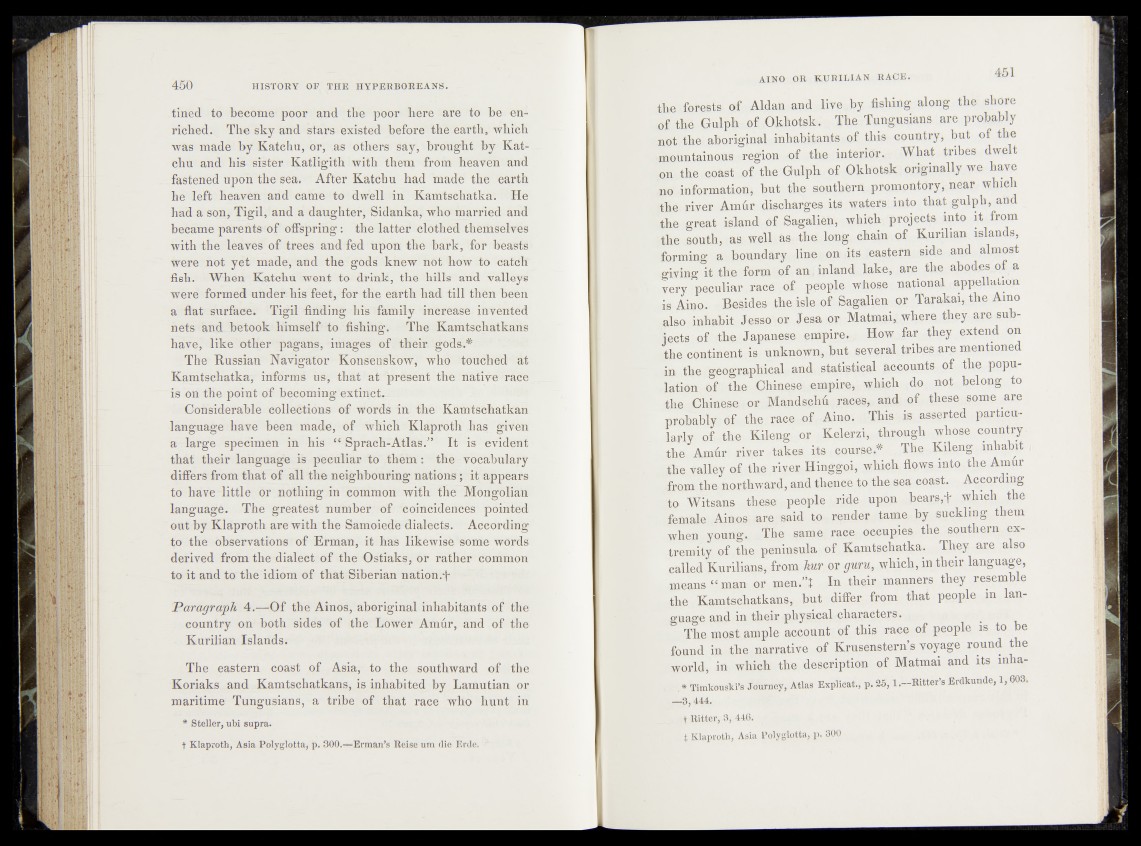
tined to become poor and the poor here are to be- enriched..
The sky and stars existed before the earth, wbibh
was made by Katchu, or, las others' say, brought by Ka&
chu and his sister Katligith with them from heavens and
fastened upon the sea. After Katchu had made the earth
he left heaven and came to dwell in Kamtschatka; Hlf
had a son, Tigil, and a daughter, Sidanka, who marriediand
became parenteof offspring: the latter clothed themselves
with the leaves of trees. and fed upon the bark, for beasts
were not yet made, and the gods knew not how to catch
fish. When Katchu went to drink, the hills and valleys
were formed under-his feet,, for the earth had till then been
a flak surface. Tigil finding his "family increase invented
nets and betook himself to fishing. The Kamtschatkahs
have^ iike other pagans, images of their g©dsi.#
The Russian Navigator Konsenskow, who touched^at
Kamtschatka, informs us, that a t present the native*race
is on the point of becoming extinct—:
Considerable collections of words in the Kamtschatkan
language have been made, of which Klaproth has given
a large specimen in his “ Sprach-Atlas/’ It is 'evident
that their language is peculiar to them: the vocabulary
differs from that of all the neighbouring nations |Mt appears
to have little or nothing in common with the Mongolian
language. The greatest number of 'Coincidences pointed
out by Klaproth are with the Samoiede dialects. According
to the observations of Erman, it has likewise 'some words
derived from the dialect of the Ostiaks, or rather common
to it and to the idiom of that Siberian nation .p
Paragraph 4.—Of the Ainos, aboriginal inhabitants of the
country on both sides of the Lower Amur, and of the
Kurilian Islands.
The eastern coast of Asia, to the southward of the
Koriaks and Kamtschatkans, is inhabited by Lamutian or
maritime Tungusians, a tribe of that race who hunt in
* Steller, ubi supra.
t Klaproth, Asia Polyglotta, p. 300.—Erman’s Reise urn die Erde.
AINO OR KURILIAN RACE;: 451
Aldan and liv e ly fishing along the shore
of the Gulph .of Okhotsk. the^Tungusians are probably
not the aboriginal inhabitants^ tin*-country * but of the
•mountainous tregiop- of the interior.. >Wbat tribes dwelt
-©n- the .coast of the Gulph of Okhotsk originally we have
^ -information, b]$$ th | jsontberfi promontory, near which
the rivei1 Amur discharges its waters; intojhat gulph, and
the great isl4nA: of SagalieiT, which projects into it-from
the south, as. well as^the^lpng,Chain .©£ Kurilian.islands,
forming a boundary Unf^pu.jitg. eastern side, and almost
giving it the.:f©rm o& an, inland lake, are the abodps.of a
. race of popple whos,ef; national , appellation
is Aino^ % Be|idf$ the %le#o£ Sagaiien or Tafakai, the Amo
«giso inhabit Jessp'tor Jesa or. Matmai,[wbofe they, are subjects
of the Japanese-empire^ IIow J a r...tb ^ extend on
the continent is unknown, b u t^y g ra l trlb.egj.re mentioned
in the geographical and statistical pccounts p^tlie^pgpu-1
latio-n 6f'psth^,Qiii^se^ empire, which <<%>., not belong to
the /vChinhse^or MandscfipraceS, andi^^th^feigome are
[probably of, ttasrace of Aino \i This ^asserted particn-
laply. of-»the Kileng Q Q B gfcoiigfc ^ h >m W ntTJ.
the Amur; riv;er stakes i$s fcp;wrg£V* dtJgs Kileng, inhabit
the valley of the river Hinggei, which flo.wS;int,b the Amur
from.the northward, and thence to the.sea coast. : According
-to Witsans these people; ride U l ^ ^ ^ ^ ^ h ^ h the
female Ainos are said to render tapie,. by suckling them
. when -y&ung., The same racje occupies .-the southern extremity
of the peninsula-of Kamtschatka. They, are also
called Kurilians, from hur or guru, which, in their language,
means “ man or men.”! In their manners they resemble
the Kamtschatkan!^ but differ from that people m language
and in their physical characters. *.-*.• ^ - _
The most ample account of this race of pegple^is to be
found in the narrative .of Krusenstern’s, voyage round the
world, in which the description of Matmai and its inha-
. * I'imk'ouski’s Journey, Atlas Explidat., p. 35, l.-R itte r ’s Er4kunde^603.
—8,444.
t Ritter, 3, 446.
X Klaproth, Asia Polyglotta, p. ?00